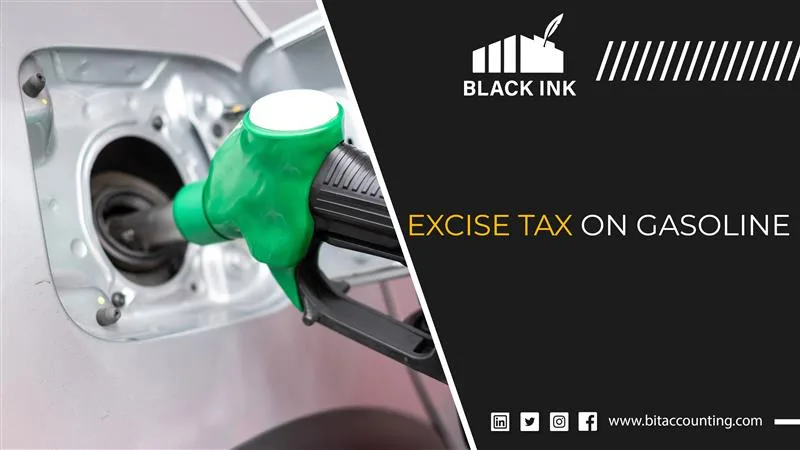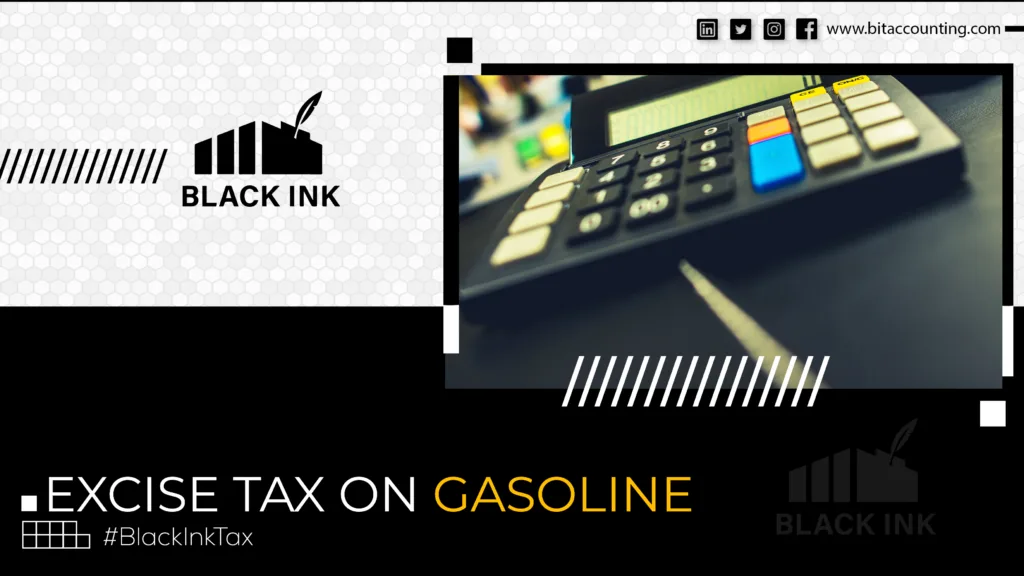
Table of Contents
Why Does an Excise Tax on Gasoline Exist?
If you’ve ever looked at your gas receipt and wondered why gas prices seem to include more than just the fuel itself — you’re not alone. Part of the price you pay at the pump is a tax, and it’s not just any tax — it’s something called an excise tax.
Excise taxes are everywhere, and gasoline is one of the most common items they’re placed on. But why? Why does an excise tax on gasoline exist in the first place?
In this blog, we’ll break down what gasoline excise taxes are, how they work, their history, the reasons behind them, and what the future might look like. We’ll keep things simple and help you understand how this hidden part of your gas bill impacts roads, budgets, the environment — and you.
What Is an Excise Tax on Gasoline?
An excise tax is a type of indirect tax. That means it’s not directly paid by you to the government, like income tax. Instead, it’s charged on specific goods, often at the time they’re made or sold. Gasoline, cigarettes, and alcohol are all common targets of excise taxes.
Unlike a sales tax, which is added to most purchases and is usually a flat percentage, an excise tax is more focused. It’s aimed at certain goods, often for specific reasons — like health, the environment, or funding public services.
So, when it comes to gasoline, excise taxes are built into the price. You don’t see them as a separate line at checkout, but they’re there — and they’re doing more than you might think.
How Excise Tax on Gasoline Works
There are two common ways gasoline excise taxes are calculated:
- Per-gallon tax: A set amount is added for every gallon sold (e.g., 18.4 cents per gallon in the U.S. at the federal level).
- Percentage-based tax: Some places apply a tax as a percent of the sale price.
In the U.S., we have both federal and state gasoline taxes. The federal government charges a flat fee per gallon, while each state adds its own tax on top. Some states also allow local governments to add more.
But who really pays the tax?
Technically, the tax is first paid by distributors or retailers. But in practice, the cost is passed on to you — the consumer. Every time you fill up, you’re helping fund roads, infrastructure, and more through that excise tax.
Historical Context of Excise Tax on Gasoline
Explore the historical context of the excise tax on gasoline:
Origins of Gasoline Taxation
The idea of taxing gasoline isn’t new. In the U.S., the first federal gas tax was introduced in 1932, during the Great Depression. At just 1 cent per gallon, the goal was to raise funds for struggling public programs.
Soon after, it became clear that gas taxes could help pay for something else Americans desperately needed: better roads. Cars were becoming more common, and highways were popping up everywhere. Gasoline taxes became a tool to fund that growth.
Evolution Over Time
Over the years, the gasoline tax has grown — but not always fast enough. Adjustments were made for inflation, changing transportation needs, and political decisions.
While it started as a way to build roads, today the money often goes beyond transportation. In many places, it helps fund schools, public transit, or even general government spending.
Key Reasons for Gasoline Excise Taxes
Here are the reasons for the excise tax on gasoline:
Funding Transportation Infrastructure
This is the main reason gasoline taxes were introduced, and still the biggest use of the money.
- Roads, bridges, and highways need constant repair and maintenance.
- Some regions also use gas tax revenue to support public transit systems.
Without this steady stream of money, our daily commutes and delivery trucks would face serious problems.
Environmental and Public Health Goals
Governments also use gas taxes to push people toward more eco-friendly behavior.
- Higher gas prices can discourage overuse of cars and reduce pollution.
- This lines up with carbon tax strategies, which charge more for using fuels that harm the planet.
- It also helps promote fuel-efficient cars and electric vehicles (EVs).
In short, gas taxes can nudge people to make choices that are better for the air we breathe.
Revenue Generation for Government Budgets
Another big reason the excise tax on gasoline exists is because it’s a reliable source of income.
People need to drive, so gasoline use is fairly steady. That means gas taxes are a predictable stream of money for government budgets.
Some governments use these funds strictly for transportation. Others put them into the general budget — helping pay for schools, police, and other services.
Economic and Behavioral Incentives
Gas taxes can also shape our habits.
- If gas is expensive, people might drive less, reducing traffic congestion.
- It also encourages carpooling, biking, and using public transportation.
So while it’s a tax, it’s also a way to guide behavior toward healthier, more efficient choices.
How Gasoline Excise Taxes Are Calculated
Learn how to calculate gasoline excise taxes are calculated:
Federal vs. State Taxes (U.S. Example)
In the U.S., the federal gasoline tax is 18.4 cents per gallon (since 1993). Diesel is taxed at a slightly higher rate.
But each state adds its own gas tax — and the rates vary a lot:
- California has one of the highest gas taxes.
- Alaska has one of the lowest.
Some states also have sales taxes or environmental fees on top of the excise tax.

International Comparisons
Other countries take different approaches.
- Many European nations charge much higher gas taxes. For example, in the Netherlands and Norway, fuel can cost more than double U.S. prices — mostly due to taxes.
- Meanwhile, places like Venezuela or Saudi Arabia actually subsidize gasoline, making it incredibly cheap.
These policies reflect each country’s goals — whether it’s saving money, protecting the environment, or keeping fuel affordable for citizens.
Adjustments Over Time
Some governments adjust gas taxes for inflation, so the value of the money raised doesn’t shrink over time.
But increasing gas taxes can be politically tricky. Many voters resist price hikes, and politicians don’t always want to be the ones to push them through.
Criticisms and Controversies of Gasoline Excise Taxes
The following are the criticisms and controversies of gasoline excise taxes:
Regressive Nature of Gas Taxes
One of the biggest criticisms is that gas taxes are regressive.
That means they hit low-income people harder, because everyone pays the same rate, regardless of income.
Also, people in rural areas often rely more on driving than those in cities, making the burden even greater for them.
Inefficiencies in Fund Allocation
Some argue that gas tax money isn’t always used the way it should be.
- In some cases, funds meant for roads are diverted to unrelated projects.
- Despite steady tax income, infrastructure maintenance can still fall behind.
This makes people question whether the tax is really solving the problems it was meant to fix.
Pushback from Consumers and Industries
Nobody likes paying more for gas. So whenever gas taxes are raised, there’s often public resistance.
Big industries — especially oil and auto companies — also push back. They may fund lobbying campaigns to fight higher taxes or new environmental rules.
The Rise of Electric Vehicles (EVs)
As more people switch to EVs, gasoline use is dropping — and so is tax revenue.
That raises the question: If fewer people buy gas, how will we pay for roads?
Some governments are exploring new funding models, like mileage-based taxes, to fill the gap.
The Future of Gasoline Excise Taxes
Alternative Revenue Models
Governments are already testing vehicle-miles-traveled (VMT) taxes, where drivers pay based on how far they drive, not how much gas they use.
Other ideas include:
- Toll roads
- Congestion pricing in busy city areas
These systems could replace or supplement the traditional gas tax.
Environmental Policy Shifts
Some leaders support replacing gas taxes with carbon taxes. These charge businesses and consumers based on the amount of greenhouse gases they produce.
At the same time, many countries are offering incentives for renewable energy and cleaner transportation.
Political and Public Acceptance
Change isn’t easy. Many people are used to the current system, even if it has flaws.
But with climate goals, changing technology, and shrinking gas tax revenue, governments may need to rethink the system — and get the public on board.
Conclusion
So, why does an excise tax on gasoline exist?
It’s not just about raising money. It’s about building and maintaining our roads, protecting the environment, shaping driver behavior, and funding essential services. While the system isn’t perfect, it plays a major role in how we get around and how our governments function.
As we look to a future with more electric vehicles and greener energy, gas taxes may change — or even disappear. But for now, they remain a key part of the pump price.
If you want help understanding how fuel taxes or any business taxes affect your bottom line, BIT Accounting is here to help. Our experts can guide you through every financial twist and turn.
FAQs
1: What is the current U.S. federal gas tax rate?
It’s 18.4 cents per gallon for gasoline and 24.4 cents per gallon for diesel (as of this writing).
2: Why are gas taxes controversial?
Because they can be regressive, and sometimes the funds aren’t used as promised. They also face opposition from consumers and industries.
3: Will gas taxes go away as electric cars become more popular?
Possibly. Governments are exploring new ways to collect road-use taxes, like VMT systems or carbon taxes.
4: How does a gasoline excise tax differ from sales tax?
Excise taxes are specific to certain goods and built into the price. Sales tax is applied at checkout to a broad range of products.
5: Who can help me with understanding business fuel taxes and deductions?
BIT Accounting can guide you with expert support on fuel-related expenses, taxes, and planning.
GET FREE QUOTE FOR ALL OF OUR SERVICES
Black Ink will send you a free analysis of your current state and what would be the cost of managing either a separate accounting and bookkeeping services or a complete solution across New York, USA. Do get in touch and we will be happy to consult you with our bookkeeping services in NY, New York, USA.
